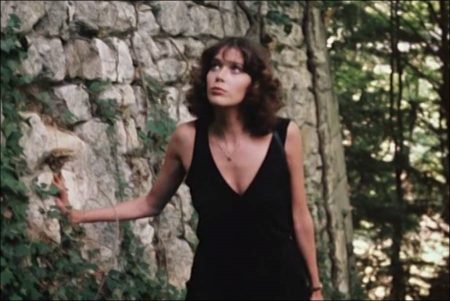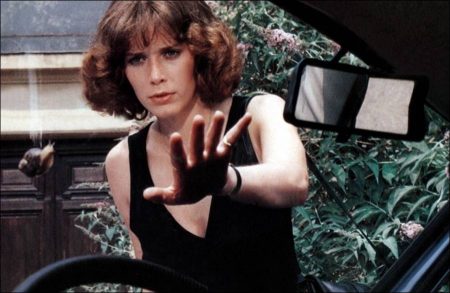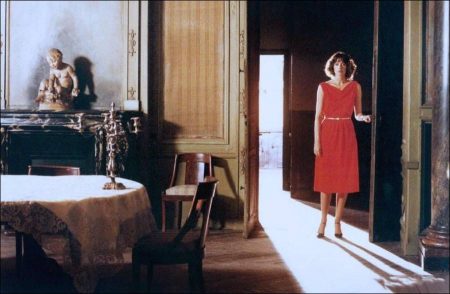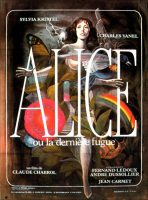Alice or the Last Escapade movie storyline. Alice Carol (Sylvia Kristel) leaves her husband one rainy night, telling him that she does not love him anymore. She travels alone but when her windscreen breaks on a lonely road, she has to stop and seek help. She goes to a creepy manor and is welcomed by the owner, Henri Vergennes, and his butler, Colas. Alice is invited to spend the night in the house.
The next morning, Alice can’t find the two men from he previous night but finds her car surprisingly fixed. She tries to leave but cannot find the gate. She stops the car and walks around the wall trying to find an exit but becomes increasingly worried with what she finds.
Alice or the Last Escapade (French: Alice ou La Dernière Fugue) is a 1977 French fantasy film written and directed by Claude Chabrol. The film is very loosely inspired by the 1865 novel Alice’s Adventures in Wonderland by Lewis Carroll, including the protagonist’s name being Alice Carroll (a combination of the Alice character and the author’s pseudonymous surname).

Film Review for Alice or the Last Escapade
“To the memory of Fritz Lang.” So reads the dedication at the opening credits of Claude Chabrol’s remarkable 1977 film Alice or the Last Escapade. Long known as “the French Hitchcock” for his suspenseful dissections of the bourgeoisie, Chabrol deeply admired Lang, the great Teutonic visionary whose characters perpetually felt the heavy grasp of Fate squeezing around their throats.
Both auteurs were expert engineers of cinematic steel-traps, and yet their sense of geometric doom hid more than a hint of dark poetry. (Think, for instance, of Lang’s Secret Beyond the Door or Moonfleet.) It’s fitting, then, that the younger director’s tribute turns up in a film that mingles ruthless dread with metaphysical enchantment in ways that would have made his idol proud.
Alice’s pre-credits sequence finds Chabrol in familiar territory: Complacently sprawled before a TV set, a man (Bernard Rousselet) eats grapes and brags about swindling clients until his wife (Sylvia Kristel) calmly announces that she’s can’t stand being with him for even a second longer. Anxieties within domestic settings have been the running theme of Chabrol’s career, but here he compresses them in a terse, four-minute prologue and heads out in a different direction.
And it is that new direction, quite different from and more challenging than a simple thriller path, that might explain why the film remains such an obscure item in the director’s oeuvre. Though he worked virtually nonstop from his 1958 debut to his 2010 swansong, Chabrol went through several creative periods, and his 1970s work brims with woefully overlooked items. Exchanging his trademark sleekness for surreal experimentation, Alice is this period’s most fascinating work.
That Kristel’s heroine is named is Alice Carol is scarcely the first of the story’s fanciful elements. Driving away from her husband, she peers at the dark, rainy road ahead—clearly a nod to Marion Crane’s fateful drive in Psycho, further transformed as Alice’s memories are superimposed before her eyes. Briefly, the windshield becomes a movie screen onto which images of her triumphant flight are projected… until it suddenly shatters.
An accident forces her off the road into a mansion, where an elderly man named Henri (Charles Vanel) and his manservant Colas (Jean Carmet) welcome her. Best remembered as a reliably dour presence in the films of Henri-Georges Clouzot, Vanel is elaborately avuncular here, doting on his beautiful young guest with a plate of omelets and a glass of wine. His smiling courtliness feels oddly ominous; when he tells Alice that the next day her “spirit will be free to roam,” she can’t quite hide a glance of unease.
The unease is justified. A broken clock’s dormant pendulum starts swinging in the middle of the night (a most Langian image), and in the following morning Alice finds herself in a deserted estate. At first undaunted, she grows concerned as she discovers the endless wall surrounding the gardens outside. Is she a prisoner? Could this sun-dappled Eden really be some type of purgatory? “No questions,” repeats the handsome, nameless stranger (André Dussollier) she meets in the woods. “Don’t try to use your logical arguments here. They are useless.”
The Carrollesque strain expands, sounds and sights disorient. Teakettles screech and vitrolas hiccup while the air itself undulates like a funhouse mirror and Alice reaches for a telephone only to hear her own voice talking back. With its checkerboard floor, corkscrew stairs and vine-covered pillars, the house comes to suggest a tranquil behemoth leisurely digesting the heroine in its belly. “You have to live in the dark for a while,” booms a disembodied voice. “Make the most of it.”
With its bizarrely sunlit foreboding and sinister aural stingers, Alice or the Last Escapade is the closest Chabrol ever came to making a horror movie. If there’s one genre it belongs to, however, it is the Enigmatic Wandering Female Consciousness group that also include such oneiric fables as Robert Altman’s Images, Louis Malle’s Black Moon, and Roman Polanski’s Che? Like those earlier heroines, Alice must navigate peculiar landscapes in a journey that reflects the pitfalls of her struggle for emancipation.
And it’s a characteristically sardonic Chabrol gesture to cast this feminist narrative with none other than the star of the softcore box-office hit Emmanuelle. Actually, Kristel’s placid sex-bomb elegance fits the plot beguilingly, with her nude scenes feeling less like obligatory concessions to audience lechery than poignant extensions of her character’s vulnerability. Surrounded by puzzles and condescending male guardians, her Alice proves to be a resourceful explorer—while Dussollier is gassing on about female gentility, she’s busy leafing through a translation of Borges’ Fictions.
As anomalous as it may seem next to his more famous works, Alice or the Last Escapade is profoundly Chabrolian. Jean Rabier’s cinematography, full of graceful tracking shots and measured zooms, fills the mansion’s verdant gardens with as much polished menace as the luxury-choked interiors of Les biches and La femme infidèle. The comic absurdism that’s always just beneath the surface explodes here, as when a funeral gathering at a café suddenly morphs into a riotous soiree.
And Chabrol’s preoccupation with intimations of hellfire, first noticed in his debut Le beau Serge and never fully repudiated, rears its head fragrantly as the story speeds toward a twisty climax of malevolent syringes and infernal portals. The resulting fairy-tale may not have resonated with mainstream audiences at the time of release, but its dreamlike gravity should transfix cinephiles and cineastes then and now—it wouldn’t be surprising to learn that David Lynch or Guillermo del Toro caught a screening or two of it.
Alice or the Last Escapade (1977)
Directed by: Claude Chabrol
Starring: Sylvia Kristel, Charles Vanel, Jean Carmet, Fernand Ledoux, André Dussollier, François Perrot, Thomas Chabrol, Jean Cherlian, Catherine Drusy, Jean Le Boulbar
Screenplay by: Claude Chabrol
Production Design by: Maurice Sergent
Cinematography by: Jean Rabier
Film Editing by: Monique Fardoulis
Set Decoration by: Philippe Turlure
Music by: Pierre Jansen
MPAA Rating: None.
Distributed by: Union Générale Cinématographique (UGC)
Release Date: January 19, 1977
Visits: 278


